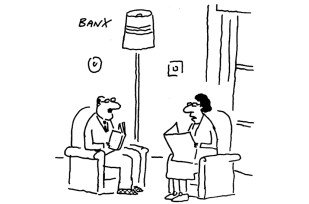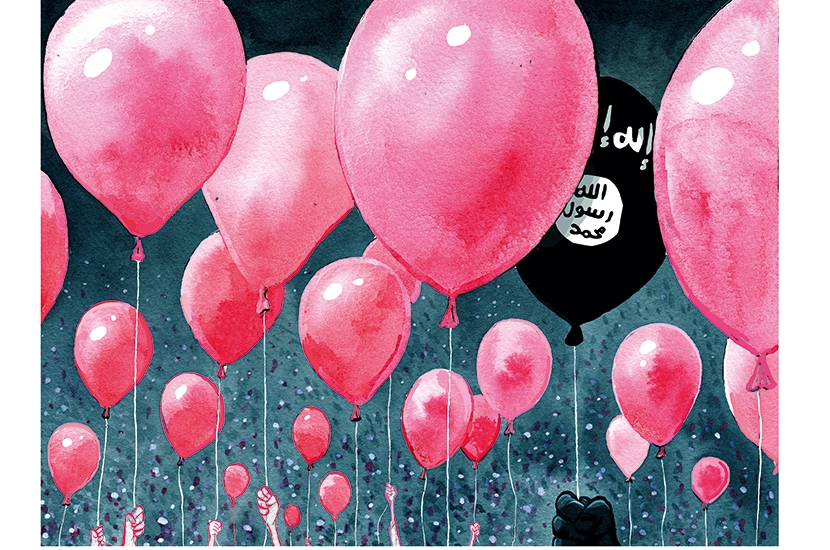The official review into the Manchester Arena bombing was published this week. Four years after 22 mainly young people were killed at a pop concert, the review by Sir John Saunders reveals a catalogue of failings, as such reviews always do. Yet one failing stood out in particular.
On the night in question the bomber, Salman Abedi, had been standing around the exits to the stadium for over an hour and a quarter. You would have thought that in that time, the sweaty young man with a rucksack might have attracted some attention. And you would be right. A number of people, including security guards hired to protect the venue, expressed alarm about the man struggling to walk because of the weight of his rucksack, which was packed with a 32kg bomb. One, called Kyle Lawler, had the honesty to tell the inquiry about his reaction. He said that he sensed that there was ‘something wrong’ about Abedi. He said that Abedi had ‘a slightly nervous reaction’ when people looked at him and that he ‘seemed fidgety’. Lawler admitted that he wasn’t sure what to do and that although the national terror threat level was at ‘severe’, he knew nothing of any ‘potential attack’.
The report goes on: ‘He [Lawler] stated he was fearful of being branded a racist and would be in trouble if he got it wrong.’ It might be easy to castigate Mr Lawler here. But in truth he only made the same calculation almost any sensible person would make in a similar situation.

One of the mantras of the age of terrorism has been ‘See something, say something’. But as I have often pointed out, if you do ‘see something’ in modern Britain, you would be utterly mad to say something. What sort of thing might you see? A dodgy-looking person fitting the profile of an Islamic suicide bomber? And what would you say? That there’s a dodgy-looking person fitting the profile of an Islamic suicide bomber? Good luck with that, chum. As Jonathan Hall QC, the government’s Independent Reviewer of Terrorism Legislation, said this week: ‘The Manchester Arena attack wasn’t about a failure to combine information. It was a failure to see what was actually there.’ Sometimes, he went on, ‘stopping terrorism is about seeing what is there in front of you’.
Yet who would do that? When asked what Mr Lawler ought to have done, Jonathan Hall’s only answer was that people should have more confidence. Which is easy to say. But you can’t just invite a population to have more confidence after beating it out of them for decades.
There is nothing hypothetical about that statement. Because as it happens, Manchester got a horrible comic test run of the Arena attack just one year earlier. Almost exactly a year before Salman Abedi went to greet the crowds streaming out of the Ariana Grande concert, Greater Manchester Police staged a mock terrorist attack in Manchester shopping centre to test the preparedness of the emergency services, their readiness and response times. At a certain stage an actor playing a suicide bomber came through a doorway into the crowded shopping centre and detonated a fake explosive device.
A number of people expressed alarm about the man struggling to walk because of the weight of his rucksack
All of this could have proved very useful for the Manchester emergency services, but the test was overshadowed by one particular detail. Before detonating the fake device in the mock terrorist attack of May 2016 the hired actor shouted the words ‘Allahu Akbar’ (‘Allah is greatest’). Before the fake bomb could flash, the backlash had begun.
Word of the outrage got out and was immediately condemned. ‘Community leaders’ and others took to the airwaves to deplore this appalling connection. Soon it was a major national scandal; the sort that almost everyone forgets about afterwards. But at the time it raged along. On Sky, Kay Burley interviewed a ‘community worker’ called Jahangir Mohammed who lamented that people needed to have ‘a bit of religious and cultural context’. He also warned about ‘the possible implications and the effects on wider society and communities within that society’. Such sinister waffle won the day.
Soon assistant chief constable Garry Shewan was on the air apologising, saying: ‘On reflection, we acknowledge that it was unacceptable to use this religious phrase immediately before the mock suicide bombing, which so vocally linked this exercise with Islam. We recognise and apologise for the offence that this has caused.’
Greater Manchester’s police and crime commissioner, Tony Lloyd, joined in, explaining that: ‘It is frustrating the operation has been marred by the ill-judged, unnecessary and unacceptable decision by organisers to have those playing the parts of terrorists to shout “Allahu Akbar” before setting off their fake bombs. It didn’t add anything to the event, but has the potential to undermine the great community relations we have in Greater Manchester.’
And that, right there, is the context in which Kyle Lawler made his calculation one year later. He wasn’t some powerful police supremo. He only worked for one of those crappy security companies who give a veneer of security at public events before things really get serious. But perhaps Lawler remembered the furore a year earlier? Perhaps he was even involved in the training exercise. Even if he didn’t remember that particular event, he could have recalled a hundred similar cases and will have known, as every sensible person does, that it would be the action of a madman to put a step wrong when linking a sweaty young man from a certain background, carrying a backpack, with the name of Allah.
There are a lot of questions which remain unanswered in the case of Salman Abedi. One that I have never been able to get to the bottom of is why he or any of his wretched family were in the UK in the first place. The parents were involved with a Libyan Islamic fighting group which fell out with Colonel Gaddafi in the 1990s. So they wound up getting sanctuary in the UK. And I still can’t find a single politician or immigration official in this country who will deign to explain exactly how that happened or how we in Britain benefited from this arrangement. Instead we have all the usual poring over protocols, almost none of which does any good at all.
All that is confirmed is one thing. Which is that in modern Britain being branded a racist is indeed a fate worse than death. Worse than 22 deaths, to be precise. A hundred calls for ‘confidence’ won’t alter that fact.







Comments